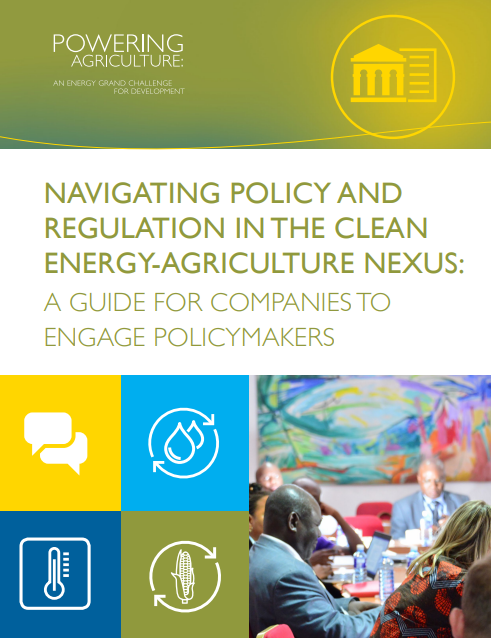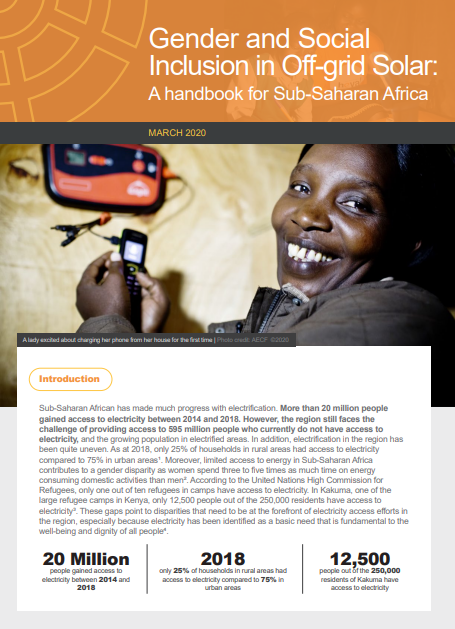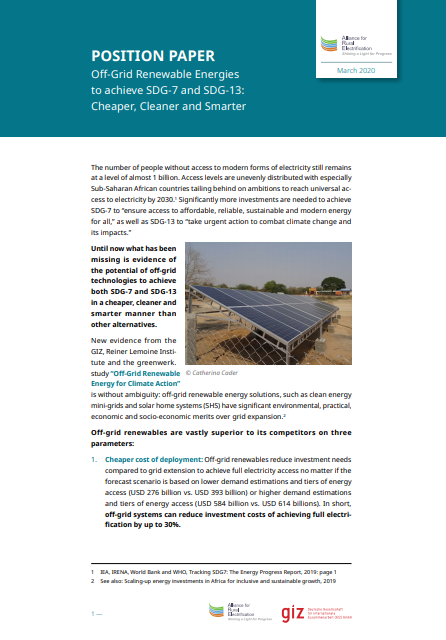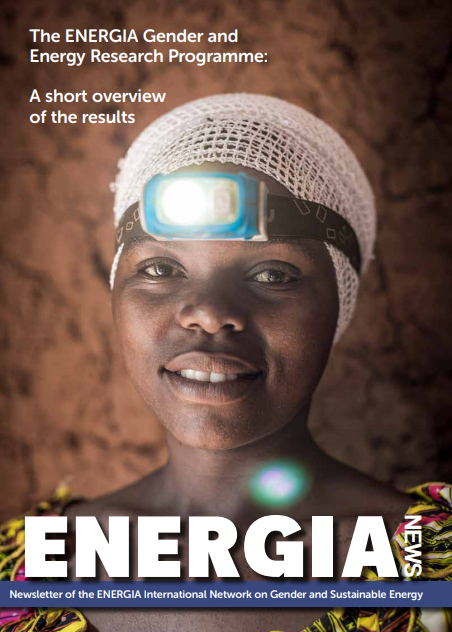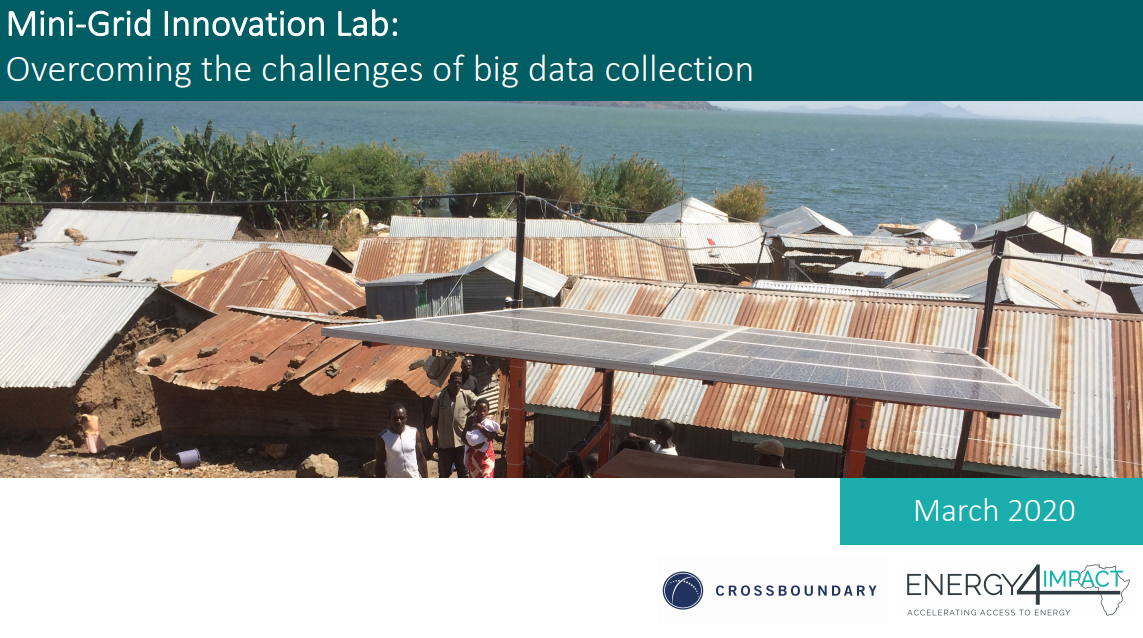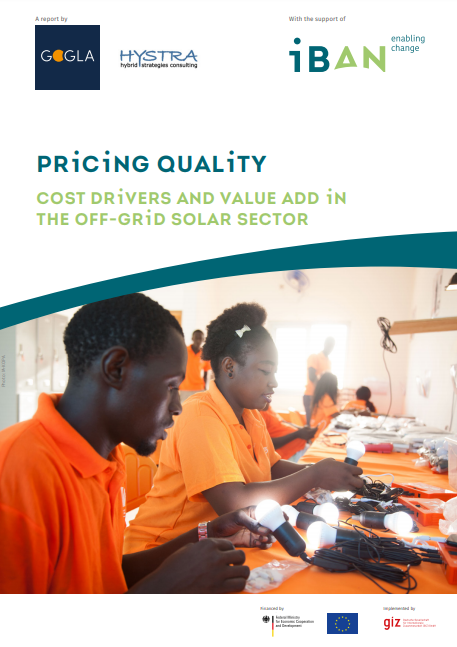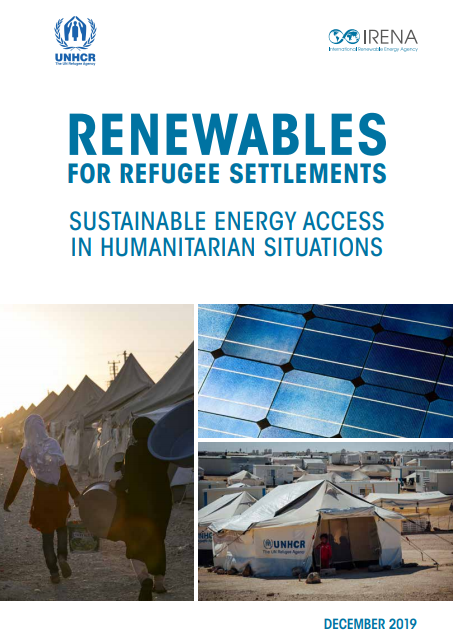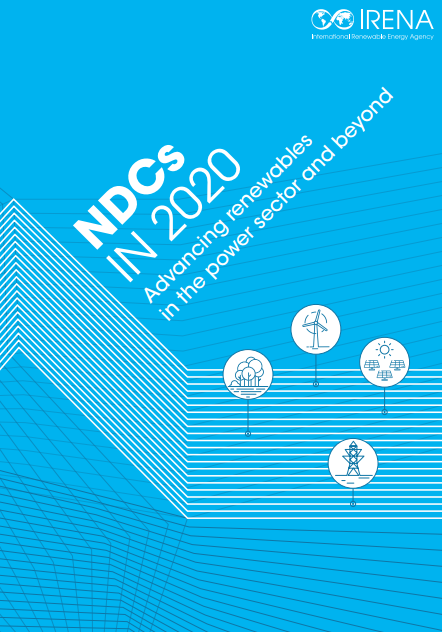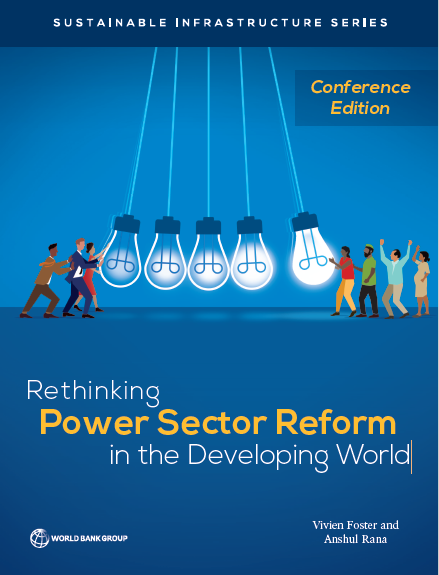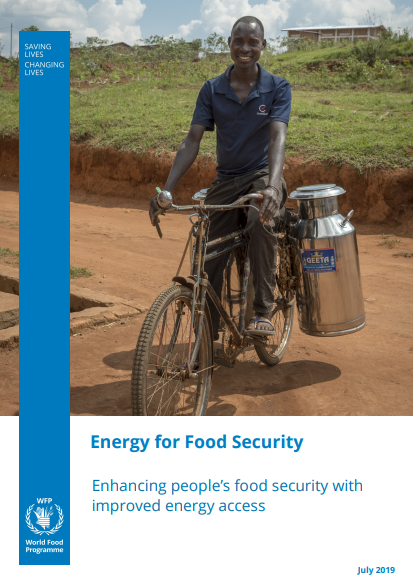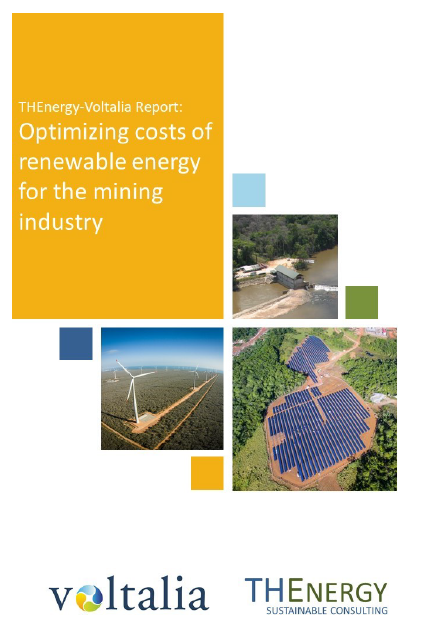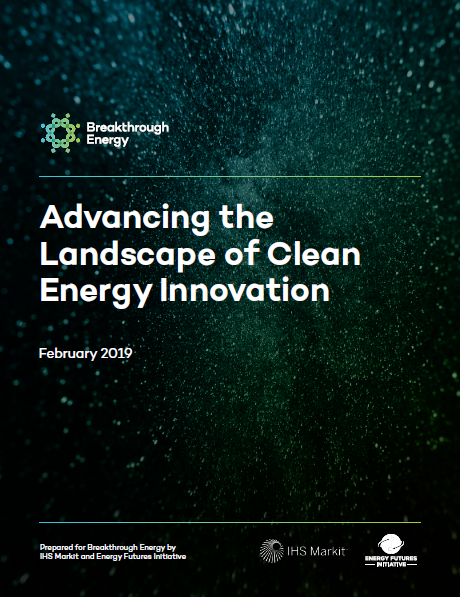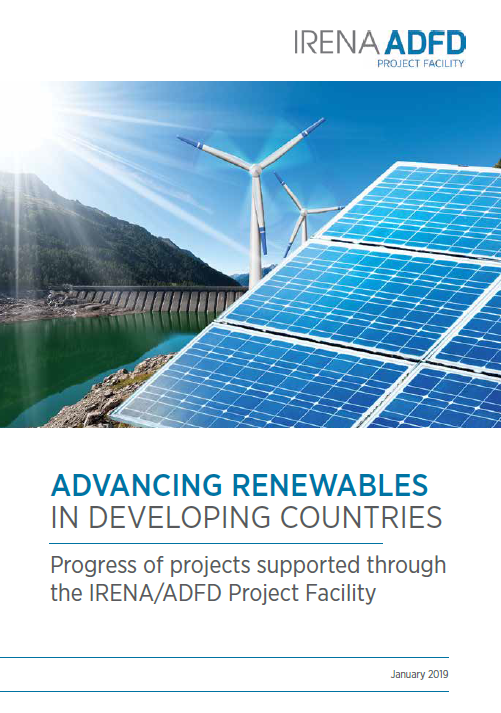We post here the relevant reports for the power sector in Africa. Feel free to join our efforts and share us any other you may have found. We'd be glad to add them to the list. Just sent an email to This email address is being protected from spambots. You need JavaScript enabled to view it.
Browse by Region:
Publication date: April 2020
Author: IRENA
Description: The Global Renewables Outlook shows the path to create a sustainable future energy system. This flagship report highlights climate-safe investment options until 2050, the policy framework needed for the transition and the challenges faced by different regions. As the world seeks durable economic solutions, accelerated uptake of renewables promises to drive sustainable development, boost well-being and create tens of millions of new jobs.
Download Report >>
Visit Website >>
Publication date: 20 March 2020
Author: Powering Agriculture
Description: Innovators and entrepreneurs are introducing new technologies and business models that hold great promise for increasing agricultural productivity, reducing post-harvest loss and boosting farmer incomes in emerging markets. In the same way off-grid solar home systems commercialization has reached hundreds of millions of users, there is great potential for clean energy-agriculture solutions to grow exponentially given the right market conditions.
Download Report >>
Visit Website >>
Publication date: March 2020
Author: Africa Clean Energy
Description: Sub-Saharan African has made much progress with electrification. More than 20 million people gained access to electricity between 2014 and 2018. However, the region still faces the challenge of providing access to 595 million people who currently do not have access to electricity, and the growing population in electrified areas. In addition, electrification in the region has been quite uneven. As at 2018, only 25% of households in rural areas had access to electricity compared to 75% in urban areas.
Download Report >>
Visit Website >>
Publication date: March 2020
Author: ARE
Description: The number of people without access to modern forms of electricity still remains at a level of almost 1 billion. Access levels are unevenly distributed with especially Sub-Saharan African countries tailing behind on ambitions to reach universal access to electricity by 2030. Significantly more investments are needed to achieve SDG-7 to “ensure access to affordable, reliable, sustainable and modern energy for all,” as well as SDG-13 to “take urgent action to combat climate change and its impacts.”
Until now what has been missing is evidence of the potential of off-grid technologies to achieve both SDG-7 and SDG-13 in a cheaper, cleaner and smarter manner than other alternatives.
New evidence from the GIZ, Reiner Lemoine Institute and the greenwerk. study “Off-Grid Renewable Energy for Climate Action” is without ambiguity: off-grid renewable energy solutions, such as clean energy mini-grids and solar home systems have significant environmental, practical, economic and socio-economic merits over grid expansion.
Download Report >>
Visit Website >>
Publication date: March 2020
Author: ENERGIA
Description: In this ENERGIA News you will find evidence and highlights from the Gender and Energy Research programme, in which ENERGIA has worked, since 2014, with nine teams of researchers in 12 countries. This research programme has built an evidence base to support informed policy making to decrease gender inequalities in energy access and benefits of energy access. It has contributed to the development of an evidence base for improving energy investment effectiveness by understanding and better addressing women’s specific needs for modern energy services. The objective of the Programme has been to generate and analyse empirical evidence on the links between gender, energy and poverty, and to inform policy and practice. The research themes were developed based on identification of priority gaps in evidence in the following areas: impacts of electrification; productive uses of energy; political economy of gender in energy sector; energy sector reform; the role of the private sector in scaling up energy access; women’s energy entrepreneurship.
Download Report >>
Publication date: March 2020
Author: Energy4Impact
Description: Between January 2017 and December 2019, Energy 4 Impact and CrossBoundary collected, cleaned and analysed 550 million data points for the Mini-Grid Innovation Lab, using smart meters, field surveys, and financial records from 62 sites of 12 mini-grid developers. The data collection had two main objectives: tracking how business model innovations, such as tariff reduction or appliance financing schemes, affected the revenues and costs of mini-grid developers; and measuring the socio-economic development impact on the communities served by the mini-grids. This report presents lessons from managing one of the largest mini-grid datasets in sub-Saharan Africa to date.
Download Report >>
Visit Website >>
Publication date: 2020, January
Author: GOGLA
Description: Building on Hystra’s experience working on solar for the past 10 years and GOGLA knowledge of their members, complemented with 15+ interviews of off-grid solar players and experts, this report presents the main cost drivers in the provision of quality products and services (including both upstream in product manufacturing, and downstream in product sales and added services) and the levers policymakers and industry players can use to narrow the price gap with non-quality products.
Download Report >>
Publication date: 2019, December
Author: IRENA
Description: Refugees and displaced people mostly depend on energy that is unsustainable and can harm their health and well-being. Sustainable energy based on renewables, in contrast, bridges the gap between humanitarian response and development, enhancing the well-being of displaced people and communities.
Download Report >>
Publication date: 2019, December
Author: USAID
Description: Energy utility companies in sub-Saharan Africa (SSA) are powerful drivers of economic and social development. Utilities are often among the largest employers in a community and can therefore drive socially inclusive economic development and empowerment when unlocking opportunities for women. Not only is hiring women anti-discriminatory, but effectively developing women’s talent can be key in improving a utility’s operational performance.
This brief presents new baseline data from across the SSA region to understand women’s roles and leadership in utilities, which will be essential to measure future progress of women’s participation in the sector. Additionally, this analysis identifies some of the interventions implemented by SSA utilities, such as on-campus recruiting activities, mentorship programs, and sexual harassment policies.
Download Report >>
Publication date: 2019, December
Author: IRENA
Description: Countries need to be increasingly ambitious in their pledges to scale up renewables and cut energy-related carbon dioxide (CO2) emissions. The first round of Nationally Determined Contributions (NDCs) pledged under the Paris Agreement have proven inadequate to meet climate goals.
The new NDC round starting in 2020 represents an important chance to strengthen targets for renewables. This brief from the International Renewable Energy Agency (IRENA), released at the global climate meeting COP25 in late 2019, underlines the opportunity to address the climate threat, decarbonise energy use and simultaneously achieve multiple Sustainable Development Goals (SDGs).
Download Report >>
Publication date: 2019, November
Author: Practical Action
Description: The Poor People’s Energy Outlook 2019 is the culmination of four years’ research, exploring what it takes to realize the kinds of energy services that enable people to thrive despite limited energy access. The Practical Action report compiles and updates key messages and recommendations on energy access planning (PPEO 2016), financing (PPEO 2017) and delivering at scale, while also leaving no one behind (PPEO 2018).
Download Report >>
Publication date: 2019, November
Author: IRENA
Description: Reducing carbon dioxide (CO2) emissions is at the heart of the world’s accelerating shift from climate-damaging fossil fuels towards clean, renewable forms of energy. The steady rise of solar photovoltaic (PV) power generation forms a vital part of this global energy transformation.
In addition to fulfilling the Paris Agreement, renewables are crucial to reduce air pollution, improve health and well-being, and provide affordable energy access worldwide. This paper from the International Renewable Energy Agency (IRENA) presents options to speed up deployment and fully unlock the world’s vast solar PV potential over the period until 2050.
Download Report >>
Publication date: 2019, October
Author: Sustainable Energy for All
Description: Taking the Pulse 2019 details the energy access financing challenge faced in three countries: Madagascar, the Philippines and Uganda. The report provides crucial insights into how national contexts shape finance flows for electricity and clean cooking access. Each of these countries has its own unique set of energy needs, existing infrastructure, policies and regulations.
Download Report >>
Publication date: 2019, September
Author: World Bank
Description: Rethinking Power Sector Reform in the Developing World is a multiyear initiative that aims to refresh the policy debate, by presenting a comprehensive picture of developing country experience with power sector reform that distills the lessons learned over the last 25 years and reflects on how recent technological trends that are disrupting the sector may call for new thinking on reform strategies.
Download Report >>
Publication date: 2019, July
Author: World Food Programme (WFP)
Description: WFP’s efforts to achieve zero hunger can be strengthened by providing the energy beneficiaries need for producing, transforming and consuming food, which will enhance both their food security and nutrition.
Download Report >>
Publication date: 2019, May
Author: ECREEE / Spanish Cooperation
Description: Improvements in infrastructure, access to technology and markets are all key to increasing competitiveness of agriculture in West Africa. Sustainable energy solutions can contribute to these needs throughout the life of the crop: from irrigation to processing for final consumption. Electricity demand from agriculture in Sub-Saharan Africa is expected to double between 2015 and 2030 (World Bank, 2017).
Download Report >>
Publication date: 2019, February
Author: Voltalia / THEnergy
Description: Mines are operating in a very cost competitive environment. After labor, energy is typically the second most important operating cost factor. It is no surprise that more and more mining companies around the world are adopting renewable energy to power their mines.
Download Report >>
Publication date: 2019, February
Author: RES4Med&Africa
Description: RES4Med&Africa, in collaboration with its members led by PwC, released the new white paper “A New Instrument to Foster Large-Scale Renewable Energy Development and Private Investment in Africa”. In this white paper RES4Med&Africa analysed RE financing mechanisms’ best practices and weaknesses, thus stressing the need for a new instrument to support large scale RE plant development in Africa.
Download Report >>
Publication date: 2019, February
Author: IHS Markit
Description: The report identifies critical strengths and weaknesses of this ecosystem and offers recommendations for making that ecosystem more effective. It examines the different technology readiness stages through which innovation passes and the importance of feedback among those stages. It also discusses the significant opportunities to accelerate the pace of clean energy innovation that are presented by rapid advances occurring today across a myriad of technologies originating outside the energy sector.
Download Report >>
Publication date: 2019, January
Author: IRENA
Description: The IRENA/ADFD Project Facility represents a partnership between the two key organisations to promote renewable energy in developing countries. This report by the International Renewable Energy Agency (IRENA) and the Abu Dhabi Fund for Development (ADFD) reviews concrete progress over the first five years of their joint facility to finance such projects. Between 2014 and 2018, projects selected in five annual cycles were awarded concessional loans worth USD 214 million, with 16 projects subsequently advancing through various stages of implementation. Seven projects from early cycles reached the construction or installation stage, with renewable power generation set to start in 2019.
Download Report >>






